国际贸易实务英文版第二版周瑞琪3Export Price
- 格式:ppt
- 大小:916.50 KB
- 文档页数:32
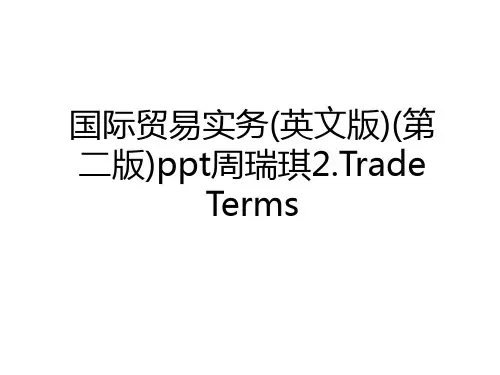
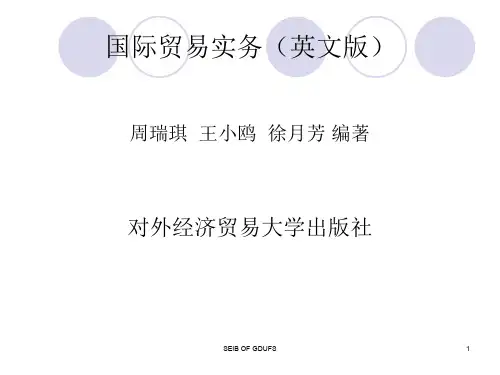
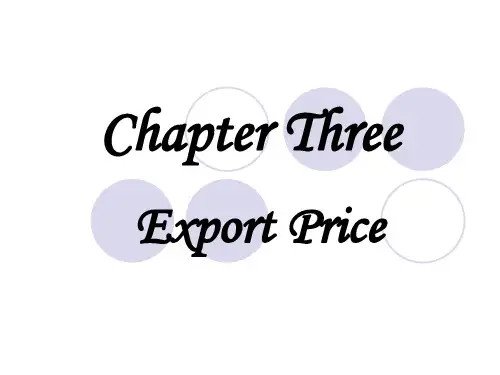
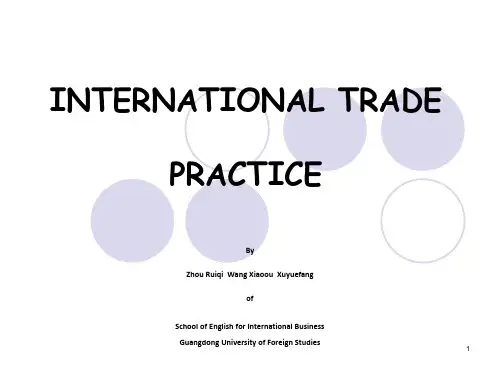

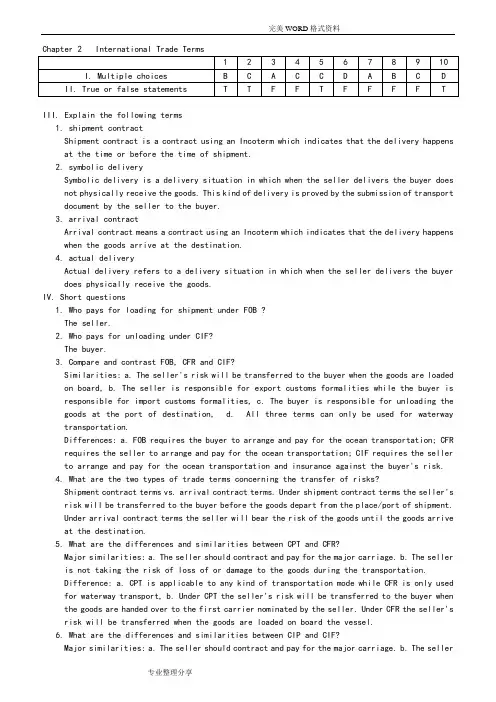
III. Explain the following terms1. shipment contractShipment contract is a contract using an Incoterm which indicates that the delivery happens at the time or before the time of shipment.2. symbolic deliverySymbolic delivery is a delivery situation in which when the seller delivers the buyer does not physically receive the goods. This kind of delivery is proved by the submission of transport document by the seller to the buyer.3. arrival contractArrival contract means a contract using an Incoterm which indicates that the delivery happens when the goods arrive at the destination.4. actual deliveryActual delivery refers to a delivery situation in which when the seller delivers the buyer does physically receive the goods.IV. Short questions1. Who pays for loading for shipment under FOB ?The seller.2. Who pays for unloading under CIF?The buyer.3. Compare and contrast FOB, CFR and CIF?Similarities: a. The seller's risk will be transferred to the buyer when the goods are loaded on board, b. The seller is responsible for export customs formalities while the buyer is responsible for import customs formalities, c. The buyer is responsible for unloading the goods at the port of destination, d. All three terms can only be used for waterway transportation.Differences: a. FOB requires the buyer to arrange and pay for the ocean transportation; CFR requires the seller to arrange and pay for the ocean transportation; CIF requires the seller to arrange and pay for the ocean transportation and insurance against the buyer's risk.4. What are the two types of trade terms concerning the transfer of risks?Shipment contract terms vs. arrival contract terms. Under shipment contract terms the seller's risk will be transferred to the buyer before the goods depart from the place/port of shipment.Under arrival contract terms the seller will bear the risk of the goods until the goods arrive at the destination.5. What are the differences and similarities between CPT and CFR?Major similarities: a. The seller should contract and pay for the major carriage. b. The seller is not taking the risk of loss of or damage to the goods during the transportation.Difference: a. CPT is applicable to any kind of transportation mode while CFR is only used for waterway transport, b. Under CPT the seller's risk will be transferred to the buyer when the goods are handed over to the first carrier nominated by the seller. Under CFR the seller's risk will be transferred when the goods are loaded on board the vessel.6. What are the differences and similarities between CIP and CIF?Major similarities: a. The seller should contract and pay for the major carriage. b. The selleris not taking the risk of loss of or damage to the goods during the transportation, c. The seller must obtain insurance against the buyer's risk.Difference: a. CPT is applicable to any kind of transportation mode while CFR is only used for seaway or inland waterway transport, b. Under CPT the seller's risk will be transferred to the buyer when the goods are handed over to the first carrier nominated by the seller.Under CFR the seller's risk will be transferred when the goods are loaded on board the vessel.7. If you trade with an American, is the sales contract subject to Incoterms without any doubt?What should you do?No. The Revised American Foreign Trade Definitions 1941 is still in use, especially in the North American area. It has different interpretation about some trade terms. The traders should clarify the choice of rules before any further discussion.8. What are the most commonly used trade terms?FOB, CFR & CIF.9. Who is responsible for carrying out customs formalities for exports under an FOB contract?The seller. According to Incoterms 2010, except EXW and DDP these two terms, all the other eleven terms require the seller to handle the export customs formalities, while the buyer the import customs formalities.10. If a Chinese trader signs an FOB Hamburg contract, is he exporting or importing?Importing. FOB should be used with a "named port of shipment", if Hamburg is the port of shipment, from the Chinese trader's perspective, he is importing.V. Case studies1. An FOB contract stipulated "The shipment will be effected in March 2011." When the goodswere ready on 10 March 201 l, the seller contacted the buyer for shipment details. The buyer faxed "Please send the goods to the port for loading on 21 March. The vessel will depart on22 March." The seller sent the goods to the port accordingly. However the nominated vesseldid not turn up and the goods had to be stored in the warehouse at the port. On the night of 21 March a fire happened in the warehouse area and part of the goods was damaged. When the vessel arrived two days later the seller and the buyer had an argument about the settlement of the loss. The seller required the buyer to bear the loss caused by the fire, but the buyer believed that the vessel arrived within the shipment period and the loss occurred before the seller delivered the goods therefore the seller should bear the loss. Please provide your solution.析:1)首先案例中提到货物发生了损失是由于货物存放在码头仓库期间发生火灾造成的。
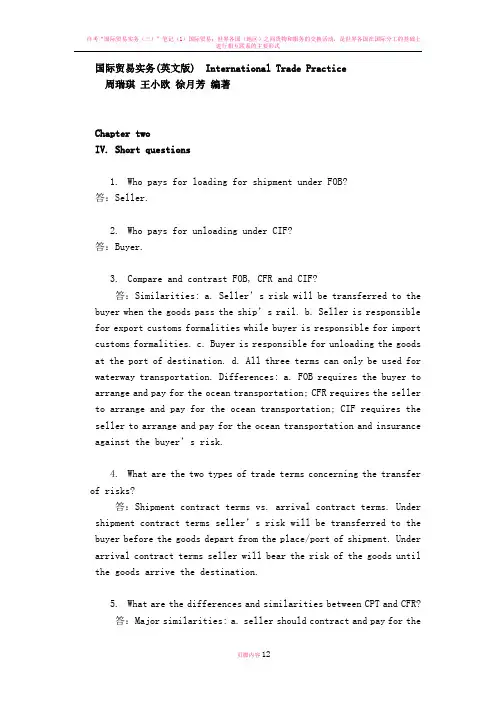
国际贸易实务(英文版) International Trade Practice周瑞琪王小欧徐月芳编著Chapter twoIV. Short questions1.Who pays for loading for shipment under FOB?答:Seller.2.Who pays for unloading under CIF?答:Buyer.pare and contrast FOB, CFR and CIF?答:Similarities: a. Sel ler’s risk will be transferred to the buyer when the goods pass the ship’s rail. b. Seller is responsible for export customs formalities while buyer is responsible for import customs formalities. c. Buyer is responsible for unloading the goods at the port of destination. d. All three terms can only be used for waterway transportation. Differences: a. FOB requires the buyer to arrange and pay for the ocean transportation; CFR requires the seller to arrange and pay for the ocean transportation; CIF requires the seller to arrange and pay for the ocean transportation and insurance against the buyer’s risk.4.What are the two types of trade terms concerning the transfer of risks?答:Shipment contract terms vs. arrival contract terms. Under shipment contract terms s eller’s risk will be transferred to the buyer before the goods depart from the place/port of shipment. Under arrival contract terms seller will bear the risk of the goods until the goods arrive the destination.5.What are the differences and similarities between CPT and CFR?答:Major similarities: a. seller should contract and pay for themajor carriage. b. Seller is not taking the risk of loss or damage to the goods during the transportation. Difference: a. CPT is applicable to any kind of transportation mode while CFR is only used for waterway transport. b. Under CPT seller’s risk will be transferred to the buyer when the goods are handed over to the first carrier nominated by seller. Under CFR seller’s risk will be transferred when the goods pass over the s hip’s rail.6.What are the differences and similarities between CIP and CIF?答:Major similarities: a. seller should contract and pay for the major carriage. b. Seller is not taking the risk of loss or damage to the goods during the transportation. c. Seller must obtain insurance against buyer’s risk. Difference: a. CPT is applicable to any kind of transportation mode while CFR is only used for waterway transport. b. Under CPT seller’s risk will be transferred to the buyer when the goods are handed over to the first carrier nominated by seller. Under CFR seller’s risk will be transferred when the goods pass over the ship’s rail.7.If you trade with an American, is the sales contract subject to Incoterms without any doubt? What should you do?答:No. The Revised American Foreign Trade Definitions 1941 is still in use, especially among the North American area. It has different interpretation about some trade terms. The traders should clarify the choice of rules before any further discussion.8.What are the most commonly used trade terms?答:FOB,CFR & CIF.9.Who is responsible for carrying out customs formalities for exports under an FOB contract?答:Seller. According to Incoterms 2000, except EXW and DDP these two terms, all the other eleven terms require the seller to handle the export customs formalities, while buyer the import customs formalities.10.If a Chinese trader signs a FOB Hamburg contract, is he exporting or importing?答:Importing. FOB should be used with a “named port of shipment”, if Hamburg is the port of shipment, from the Chinese trader’s perspective, he is importing.V.Case Studies1. An FOB contract stipulated, "The shipment will be effected in March 2008. If the vessel fails to arrive at the port of shipment on time, the seller agrees to set aside the goods for additional 27 days, and the buyer will bear all costs of delay." it turned out that under the seller's repeated requests, the vessel named by the buyer finally arrived at the port of shipment on May 1. As a result, the seller refused to make the shipment.(1)Was the seller entitled to compensation for thewarehouse rent, insurance and interest due to the delay?(2)If the seller had sold the goods to a third party onApril 25, should the buyer pay for the delay?(3)If the seller had sold the goods to a third party onMay 1 with a better price, was he entitled to any compensation?析: a案例中提到“shipment will be effected in March 2008”,这种确定装运时间的方式允许在整个3月份期间的任何时间进行装运。
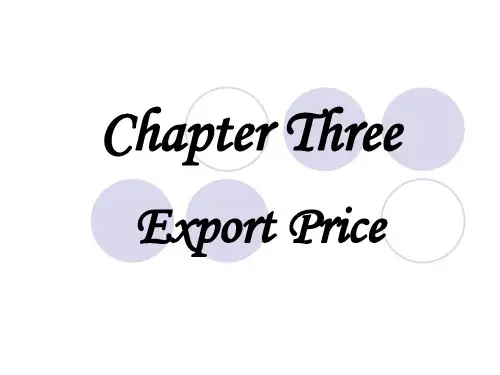
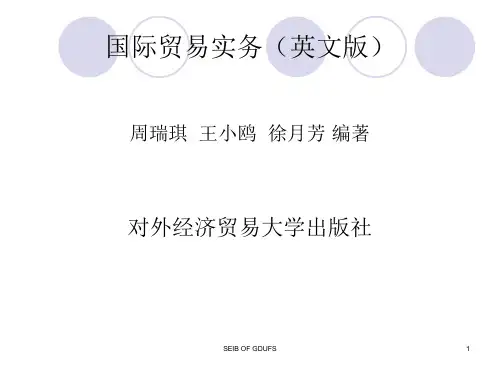
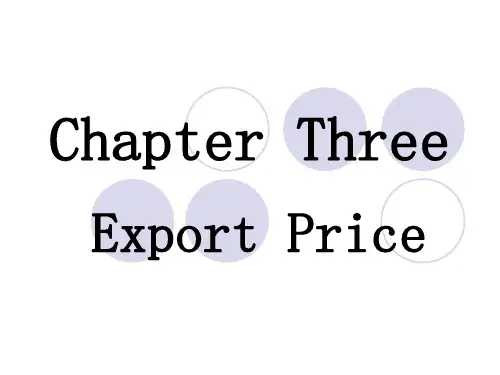
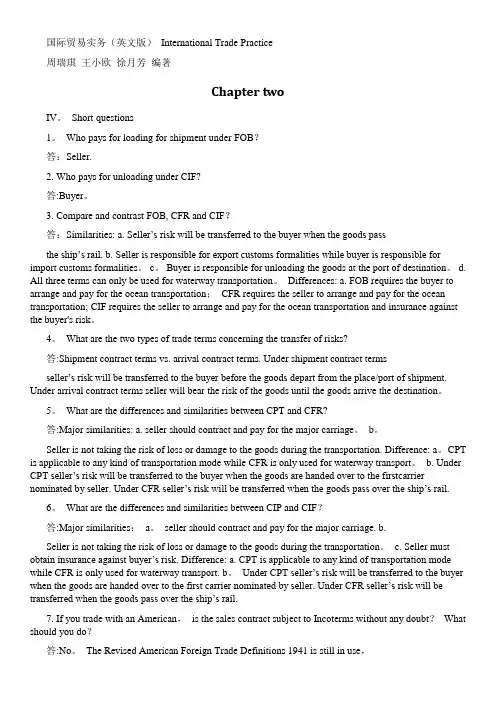
国际贸易实务(英文版)International Trade Practice周瑞琪王小欧徐月芳编著Chapter twoIV。
Short questions1。
Who pays for loading for shipment under FOB?答:Seller.2. Who pays for unloading under CIF?答:Buyer。
3. Compare and contrast FOB, CFR and CIF?答:Similarities: a. Sel ler’s risk will be transferred to the buyer when the goods passthe ship’s rail. b. Seller is responsible for export customs formalities while buyer is responsible for import customs formalities。
c。
Buyer is responsible for unloading the goods at the port of destination。
d. All three terms can only be used for waterway transportation。
Differences: a. FOB requires the buyer to arrange and pay for the ocean transportation;CFR requires the seller to arrange and pay for the ocean transportation; CIF requires the seller to arrange and pay for the ocean transportation and insurance against the buyer's risk。
国际贸易实务(英文版) International Trade Practice周瑞琪王小欧徐月芳编著Chapter twoIV. Short questions1.Who pays for loading for shipment under FOB?答:Seller.2.Who pays for unloading under CIF?答:Buyer.pare and contrast FOB, CFR and CIF?答:Similarities: a. Sel ler’s risk will be transferred to the buyer when the goods pass the ship’s rail. b. Seller is responsible for export customs formalities while buyer is responsible for import customs formalities. c. Buyer is responsible for unloading the goods at the port of destination. d. All three terms can only be used for waterway transportation. Differences: a. FOB requires the buyer to arrange and pay for the ocean transportation; CFR requires the seller to arrange and pay for the ocean transportation; CIF requires the seller to arrange and pay for the ocean transportation and insurance against the buyer’s risk.4.What are the two types of trade terms concerning the transfer of risks?答:Shipment contract terms vs. arrival contract terms. Under shipment contract terms s eller’s risk will be transferred to the buyer before the goods depart from the place/port of shipment. Under arrival contract terms seller will bear the risk of the goods until the goods arrive the destination.5.What are the differences and similarities between CPT and CFR?答:Major similarities: a. seller should contract and pay for the major carriage. b.Seller is not taking the risk of loss or damage to the goods during the transportation. Difference: a. CPT is applicable to any kind of transportation mod e while CFR is only used for waterway transport. b. Under CPT seller’s risk will be transferred to the buyer when the goods are handed over to the firstcarrier nominated by seller. Under CFR seller’s risk will be transferred when the goods pass over the s hip’s rail.6.What are the differences and similarities between CIP and CIF?答:Major similarities: a. seller should contract and pay for the major carriage. b.Seller is not taking the risk of loss or damage to the goods during the transportation. c. Seller must obtain insurance against buyer’s risk. Difference: a.CPT is applicable to any kind of transportation mode while CFR is only used for waterway transport. b. Under CPT seller’s risk will be transferred to the buyer when the goods are handed over to the first carrier nominated by seller. Under CFR seller’s risk will be transferred when the goods pass over the ship’s rail.7.If you trade with an American, is the sales contract subject to Incoterms withoutany doubt? What should you do?答:No. The Revised American Foreign Trade Definitions 1941 is still in use, especially among the North American area. It has different interpretation about some trade terms. The traders should clarify the choice of rules before any further discussion.8.What are the most commonly used trade terms?答:FOB,CFR & CIF.9.Who is responsible for carrying out customs formalities for exports under an FOBcontract?答:Seller. According to Incoterms 2000, except EXW and DDP these two terms, all the other eleven terms require the seller to handle the export customs formalities, while buyer the import customs formalities.10.If a Chinese trader signs a FOB Hamburg contract, is he exporting or importing? 答:Importing. FOB should be used with a “named port of shipment”, if Hamburg is the port of shipment, from the Chinese trader’s perspective, he is importing.V.Case Studies1. An FOB contract stipulated, "The shipment will be effected in March 2008. If thevessel fails to arrive at the port of shipment on time, the seller agrees to set aside the goods for additional 27 days, and the buyer will bear all costs of delay." it turned out that under the seller's repeated requests, the vessel named by the buyer finally arrived at the port of shipment on May 1. As a result, the seller refused to make the shipment.(1)Was the seller entitled to compensation for the warehouse rent, insurance andinterest due to the delay?(2)If the seller had sold the goods to a third party on April 25, should the buyerpay for the delay?(3)If the seller had sold the goods to a third party on May 1 with a better price,was he entitled to any compensation?析:a案例中提到“shipment will be effected in March 2008”,这种确定装运时间的方式允许在整个3月份期间的任何时间进行装运。
英文版国际贸易实务2-7答案英文版国际贸易实务2-7答案国际贸易实务(英文版)internationalTradePractice周瑞琪王小欧徐月芳编著chaptertwoiV.Shortquestions1.whopaysforloadingforshipmentunderFoB?答:Seller.2.whopaysforunloadingunderciF?答:Buyer.pareandcontrastFoB,cFRandciF?答:Similarities:a.Seller’sriskwillbetransferredtothebuyerwhenthegoodspasstheship’srail.b.Sellerisresponsibleforexportcustomsformalitieswhilebuyerisrespon sibleforimportcustomsformalities.c.Buyerisresponsibleforunloadingthego odsattheportofdestination.d.allthreetermscanonlybeusedforwaterwaytrans portation.differences:a.FoBrequiresthebuyertoarrangeandpayfortheoceant ransportation; cFRrequiresthesellertoarrangeandpayfortheoceantransportation; ciFrequiresthesellertoarrangeandpayfortheoceantransportationandinsuranceagainstthebuyer’srisk.4.whatarethetwotypesoftradetermsconcerningthetransferofrisks?答:Shipmentcontracttermsvs.arrivalcontractterms.Undershipmentcontractter msseller’sriskwillbetransferredtothebuyerbeforethegoodsdepartfromtheplace/portof shipment.Underarrivalcontracttermssellerwillbeartheriskofthegoodsuntilt hegoodsarrivethedestination.5.whatarethedifferencesandsimilaritiesbetweencPTandcFR?答:majorsimilarities:a.sellershouldcontractandpayforthemajorcarriage.b. Sellerisnottakingtheriskoflossordamagetothegoodsduringthetransportation .difference:a.cPTisapplicabletoanykindoftransportationmodewhilecFRiso nlyusedforwaterwaytransport.b.UndercPTseller’sriskwillbetransferredtothebuyerwhenthegoodsarehandedovertothefirstcar riernominatedbyseller.UndercFRseller’sriskwillbetransferredwhenthegoodspassovertheship’srail.6.whatarethedifferencesandsimilaritiesbetweenciPandciF?答:majorsimilarities:a.sellershouldcontractandpayforthemajorcarriage.b. Sellerisnottakingtheriskoflossordamagetothegoodsduringthetransportation .c.Sellermustobtaininsuranceagainstbuyer’srisk.difference:a.cPTisapplicabletoanykindoftransportationmodewhilecF Risonlyusedforwaterwaytransport.b.UndercPTseller’sriskwillbetransferredtothebuyerwhenthegoodsarehandedovertothefirstcar riernominatedbyseller.UndercFRseller’sriskwillbetransferredwhenthegoodspassovertheship’srail.7.ifyoutradewithanamerican,isthesalescontractsubjecttoincotermswithouta nydoubt?whatshouldyoudo?答:no.TheRevisedamericanForeignTradedefinitions1941isstillinuse, especiallyamongthenorthamericanarea.ithasdifferentinterpretationaboutso metradeterms.Thetradersshouldclarifythechoiceofrulesbeforeanyfurtherdi scussion.8.whatarethemostcommonlyusedtradeterms?答:FoB,cFR&ciF.9.whoisresponsibleforcarryingoutcustomsformalitiesforexportsunderanFo Bcontract?答:Seller.accordingtoincoterms2000,exceptEXwandddPthesetwoterms,all theothereleventermsrequirethesellertohandletheexportcustomsformalities, whilebuyertheimportcustomsformalities.10.ifachinesetradersignsaFoBHamburgcontract,isheexportingorimporting?答:import ing.FoBshouldbeusedwitha―namedportofshipment‖,ifHamburgistheportofshipment,fromthechinesetrader’sperspective,heisimporting. V.caseStudies1.anFoBcontractstipulated,”Theshipmentwillbeeffectedinmarch20XX.ifth evesselfailstoarriveattheportofshipmentontime,theselleragreestosetasidethe goodsforadditional27days,andthebuyerwillbearallcostsofdelay.”itturnedoutthatundertheseller'srepeatedrequests,thevesselnamedbyth ebuyerfinallyarrivedattheportofshipmentonmay1.asaresult,thesellerrefuse dtomaketheshipment.(1)wasthesellerentitledtocompensationforthewarehouserent,insuranceand interestduetothedelay?(2)ifthesellerhadsoldthegoodstoathirdpartyonapril25,shouldthebuyer payforthedelay?(3)ifthesellerhadsoldthegoodstoathirdpartyonmay1withabetterprice, washeentitledtoanycompensation?析:a案例中提到―shipmentwillbeeffectedinmarch20XX‖,这种确定装运时间的方式允许在整个3月份期间的任何时间进行装运。
国际贸易实务(英文版) International Trade Practice周瑞琪王小欧徐月芳编著Chapter twoIV. Short questions1. Who pays for loading for shipment under FOB?答:Seller.2. Who pays for unloading under CIF?答:Buyer。
3. Compare and contrast FOB,CFR and CIF?答:Similarities: a。
Seller's risk will be transferred to the buyer when the goods passthe ship's rail. b。
Seller is responsible for export customs formalities while buyer is responsible for import customs formalities. c. Buyer is responsible for unloading the goods at the port of destination. d. All three terms can only be used for waterway transportation. Differences:a. FOB requires the buyer to arrange and pay for the ocean transportation; CFR requires the seller to arrange and pay for the ocean transportation; CIF requires t he seller to arrange and pay for the ocean transportation and insurance against the buyer’s risk.4. What are the two types of trade terms concerning the transfer of risks?答:Shipment contract terms vs。